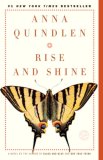Summary | Excerpt | Reading Guide | Reviews | Beyond the Book | Readalikes | Genres & Themes | Author Bio

That was best case, of course. At the home of one donor to the women's shelter
where I work, two men who were equity traders spent an entire dinner talking to
each other about the market within spitting distance-literally-of my face, bent
so close above my dinner that I couldn't reach my bread plate. At the duplex
apartment of a woman who worked with my brother-in-law at Sensenbrenner Lamott,
I'd turned to the man on my left and asked, "How do you know Amelia?" and
watched his face crumble and tears run into his beard. Everyone at the table
ignored the display as he talked of his wife, who had been our hostess's college
roommate and who had left him for a well-connected lesbian who lived in London.
With very little help from me he worked his way through their college years,
marriage, apartment renovation, career changes, and the dinner party (of course)
where he himself had been the lesbian's dinner partner, the hostess having
mistaken her for a more conventional single woman. He had invited the woman to
their home for brunch because the two shared an interest in Fiesta ware, an
interest his wife had never, in his words, "given a tinker's damn about." ("Oh,
God, he's gay himself," Meghan had said at our next breakfast. "What kind of
straight man even knows what Fiesta ware is?") In the face of his grief and
rage, the table had fallen silent except for the torrent of words from one
stay-at-home mother, who was doing a monologue about her child's learning
disabilities.
It wasn't always that bad, of course. I once dated a professor at NYU for almost
a year after I met him at a dinner party given by a woman who'd graduated from
Smith and whom I met at an alumnae phonathon. I developed a firm friendship with
a lighting tech who works on Broadway shows, an Irish expat named Jack who was
seated next to me at a neighbor's annual Fourth of July potluck.
That was a good dinner, excellent company, excellent food. There were figs with
goat cheese stuffed inside, and pumpkin bisque, and rack of lamb with broccoli
rabe. The men all run together in my head, all the
lawyers/filmmakers/academics/brokers/editors with whom I've been paired. But I
almost always remember the food, even the bad food. There was a lot of that in
the early days, before all around me grew rich while I moved from a studio to a
bigger studio to a small one-bedroom to a one-bedroom with a window in the
kitchen, that window that will be presented by brokers to apartment supplicants
as though it were a fresco by Michelangelo. As, by Manhattan standards, it is.
For some of us the kitchen with the window means we have finally arrived at some
precarious level of prosperity. For others it was a momentary triumph, a way
station between the first book proposal and the third bestseller, the summer
associate's job and the partnership, the husband who teaches comparative lit at
Columbia and the one who runs the big brokerage house. One moment a kitchen with
a blessed window, the next a kitchen with two imported dishwashers, two
glass-fronted fridges, terra-cotta floors, stainless countertops, an extra-deep
sink, a tap over the restaurant range for the pasta pots, designed in
consultation with the caterers because they use it more than the homeowners. The
kitchen is always hidden in the back of the apartment, away from the pricey
views of Central Park and the master bedroom with the cherry chest at the foot
of the bed that holds the television, which rises up out of the chest at the
touch of a bedside button. It's funny how everyone feels they need to hide the
TVs and the food, since both are the things they talk about most often. Meghan's
kitchen has a flat-screen television, although Meghan hates to watch TV when she
is not working.
"Where's Evan?" I mumbled with my mouth full.
"Evan? Evan who? Oh, you mean my husband? That is his name, isn't it? Evan."
Excerpted from Rise and Shine by Anna Quindlen Copyright © 2006 by Anna Quindlen. Excerpted by permission of Random House, a division of Random House, Inc. All rights reserved. No part of this excerpt may be reproduced or reprinted without permission in writing from the publisher.
Talent hits a target no one else can hit; Genius hits a target no one else can see.
Click Here to find out who said this, as well as discovering other famous literary quotes!
Your guide toexceptional books
BookBrowse seeks out and recommends the best in contemporary fiction and nonfiction—books that not only engage and entertain but also deepen our understanding of ourselves and the world around us.